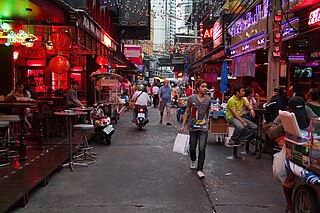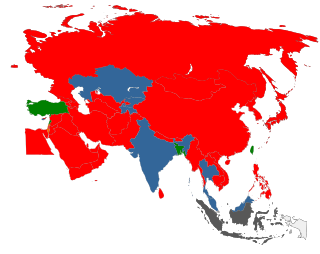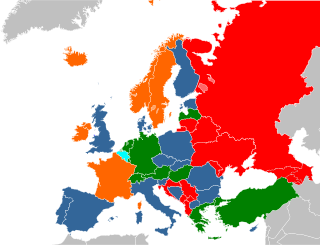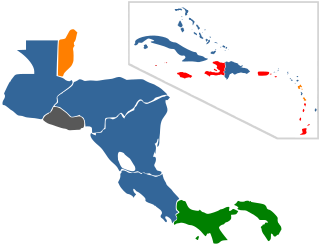Prostitution in Uruguay was legislated in 2002 through the sex work law (17.515). [1] Before that, prostitution was unlegislated but it was not illegal, since the constitution allows any activity that is not forbidden by law. [2] Prostitution is currently not a subject of debate.
UNAIDS estimate there to be 8,195 prostitutes in Uruguay. [3]
Uruguay's Law no. 17.515 of 2002 - Trabajo Sexual Se Dictan Norma (Sexual Work Standards Are Dictated) - explicitly states sex work is legal and provides regulations that must be adhered to. It also obliges the government to advise sex workers of their rights and duties, support them against exploitation and provide sexual health information. [4]
The law set up a confidential National Registry of Sex Workers. Sex works must enrol on the National Registry, this demands an initial and periodical health checks focus in the prevention, detection and treatments of sexually transmitted diseases. The register gives the worker a license which is necessary to work in brothels. Article 31 of the law provides penalties for selling sex without a health card, and their names are placed on the register. [4]
Local authorities may, in consultation with sex workers, set up local sex work areas. These must not be near educational establishments and be sensitive to local opinions. The local authority may also set working hours and dictate dress code and behaviour. [4]
Brothels and commercial sex bars are permitted provided they have the agreement of local police and are licensed. Sex may not be sold in massage establishments. [4]
The law established a "National Honorary Commission for the Protection of Sex Work", and two sex workers sit on the commission. [4]
In 1995, the Banco de Previsión Social (state-owned Uruguayan social security institute) recognised sex work by women. [5] [6] In 2009 a law was passed that recognised men and trans women in sex work. [4]
The prostitution of a minor (person under the legal age of consent) is prohibited and the authorities have the obligation to protect them from sexual exploitation and prostitution. [7] [8]
Despite this, many sex workers work on the streets or independently and not always have health checks.[ citation needed ]
Prostitution must be performed in brothels (in Uruguay they have many euphemistic names like “whiskerias” or “casas de masajes”). [1] Usually brothels use a red light as distinctive, or have discrete announcements with the name of the establishment and a suggestive phrase to attract clients.
In order to open, a brothel must have the authorization of the municipal government and the state police and follow certain rules dictated by the Ministry of Public Health. Police and municipal government are in charge of determining in which areas brothels may exist considering the characteristics of the place. However brothels may not function near schools or high schools. [1]
Minors are not allowed to enter brothels, in addition to performing any kind of activity inside. [1]
As any commercial establishment brothels pay taxes and have social security obligations.
Violation to the sex work law is punishable with fines. Pimping, commercial sexual exploitation of adults and minors is illegal and severely punished. [9] The government often launches campaigns to persuade tourists and residents of not hiring or promoting minors prostitution. [10]
There is a presence of Dominican prostitutes in Uruguay who took advantage of a formerly liberal immigration policy. [11]
The aforementioned sex labour law created the Comisión Nacional Honoraria de Protección al Trabajo Sexual (National Honorary Commission for Protection of Sexual Work) within the Ministry of Public Health, whose aim is to advise Executive Branch on this matter, watch over the fulfillment of the law, provide counseling to sex workers and promote sexual education courses and campaigns on the matter. [1]
There was a trade union named Asociación de Meretrices Profesionales del Uruguay, created in 1986, which comprised about 1200 women sex workers affiliates and whose purpose was the cooperation between sex workers, the defense of their rights, carrying out workshops and promote the prevention of STDs and HIV. Even received support from the UNFPA. [12] However it was dissolved in early 2015 under accusations of corruption of its president and vicepresident, including misappropriation of donated lands intended for HIV-infected women and donated goods for beneficiaries. [13]
Uruguay is a source, transit, and destination country for women and children subjected to sex trafficking. Uruguayan women and girls—and to a more limited extent transgender adults and male adolescents—are subjected to sex trafficking within the country. Uruguayan women and LGBTI individuals are forced into prostitution in Spain, Italy, Argentina, and Brazil; however, the number of identified Uruguayan victims exploited abroad has decreased in recent years. Women from the Dominican Republic, and to a lesser extent from South American countries, are subjected to sex trafficking in Uruguay. Uruguayan officials have identified citizens of other countries, including China and the Dominican Republic, transiting Uruguay en route to other destinations, particularly Argentina, as potential victims of sex trafficking. [14]
The United States Department of State Office to Monitor and Combat Trafficking in Persons ranks Uruguay as a 'Tier 2' country. [14]

Sex tourism refers to the practice of traveling to foreign countries, often on a different continent, with the intention of engaging in sexual activity or relationships in exchange for money or lifestyle support. This practice predominantly operates in countries where sex work is legal but there are countries where laws prohibit sex work. The World Tourism Organization of the United Nations has acknowledged this industry is organised both within and outside the structured laws and networks created by them.

Prostitution in Spain is not addressed by any specific law, but a number of activities related to it, such as pimping, are illegal. In 2016, UNAIDS estimated there to be 70,268 prostitutes in the country, although other estimates put the number higher. Most prostitutes in the country are immigrants. The sex industry in Spain is estimated to be worth €3.7 billion.
Prostitution in Guatemala is legal but procuring is prohibited. There is an offence of “aggravated procuring” where a minor is involved. Keeping a brothel is not prohibited.

Prostitution in Mexico is legal under Federal Law. Each of the 31 states enacts its own prostitution laws and policies. Thirteen of the states of Mexico allow and regulate prostitution. Prostitution involving minors under 18 is illegal. Some Mexican cities have enacted "tolerance zones" which allow regulated prostitution and function as red-light districts. In Tuxtla Gutiérrez, capital of the state of Chiapas, there is a state-run brothel at the Zona Galáctica(Galactic Zone). In most parts of the country, pimping is illegal, although pimp-worker relationships still occur, sometimes under female pimps called "madrotas"("Big Mothers"). The government provides shelter for former prostitutes.

Prostitution in Brazil is legal, in terms of exchanging sex for money, as there are no laws forbidding adults from being professional sex workers, but it is illegal to operate a brothel or to employ sex workers in any other way. Public order and vagrancy laws are used against street prostitutes. The affordability of prostitutes is the most inquired-about term in word completion queries on purchases on Google in Brazil.
Prostitution in Ecuador is legal and regulated, as long as the prostitute is over the age of 18, registered, and works from a licensed brothel. Prostitution is widespread throughout the country. Many brothels and prostitutes operate outside the regulatory system and the regulations have been less strictly enforced in recent years. 25,000 prostitutes were registered in the year 2000. In 2007 it was estimated that 70% of the prostitutes in the country were from Colombia. The country attracts Colombian prostitutes as the currency is the US$ rather than the unstable Colombian peso. UNAIDS estimate there to be 35,000 prostitutes in the country.
Prostitution in Colombia is legal, regulated and limited to brothels in designated "tolerance zones". Sex workers are required to have regular health checks. However, the laws are rarely applied and prostitution is widespread, partly due to poverty and internal displacement.
Prostitution in Bolivia is legal and regulated. It is only permitted by registered prostitutes in licensed brothels. Prostitutes must register and must undergo regular health checks for sexually transmitted diseases. The police are allowed to check whether the prostitutes are registered or not, and have attended a clinic during the previous 20 days.
Sex work in Venezuela is legal and regulated. The country's Ministry of Health and Social Development requires sex workers to carry identification cards and to have monthly health checkups. Prostitution is common, particularly in Caracas and in other domestic tourist destinations. The Venezuelan sex work industry arose in conjunction with the oil industry of the twentieth century and continues today.
Prostitution in Chile is legal, subject to regulation, but related activities such as keeping brothels and pimping are prohibited. Several hundred women were registered as prostitutes with the National Health Service.
Prostitution in Paraguay is legal for persons over the age of 18, but related activities such as brothel keeping are prohibited. Prostitution is common in the country. Brothels are also common, even some rural villages have a small bar/brothel on the outskirts.
Prostitution in Latvia is legal and regulated. The country is a destination for sex tourism.
Prostitution in Argentina is legal under Federal law. Article 19 of the constitution states: "The private actions of people that do not offend in any way the public order and morality, nor damage a third person, are only reserved to God, and are exempt from the authority of the magistrates." Organised prostitution is illegal. In addition, individual provinces may place further restriction on the trade. For example, in San Juan, publicly offering sex services for money is punishable by up to 20 days in jail. In 2012, newspapers were banned from carrying classified-ads offering sexual services. UNAIDS estimated there to be about 75,000 prostitutes in the country in 2016.

Prostitution is the business or practice of engaging in sexual activity in exchange for payment. The definition of "sexual activity" varies, and is often defined as an activity requiring physical contact with the customer. The requirement of physical contact also creates the risk of transferring diseases. Prostitution is sometimes described as sexual services, commercial sex or, colloquially, hooking. It is sometimes referred to euphemistically as "the world's oldest profession" in the English-speaking world. A person who works in this field is called a prostitute, or more inclusively, a sex worker.

Prostitution is legal and regulated in Bangladesh. Prostitutes must register and state an affidavit stating that they are entering prostitution of their own free choice and that they are unable to find any other work. Bangladeshi prostitutes often suffer poor social conditions and are frequently socially degraded.
Prostitution in El Salvador is not prohibited by national law, but may be prohibited by local municipal ordinances. Municipal ordinances may also prohibit the purchase of sexual services. Related activities such as facilitating, promoting or giving incentives to a person to work as a prostitute (pimping) are illegal. The prostitution of children is also illegal. Brothel ownership, however, is legal. There are no specific laws against human trafficking, but any criminal offence that includes ‘commerce in women or children’ requires sentencing to be increased by 30%.

The legality of prostitution in Europe varies by country.
Prostitution in Suriname is illegal but widespread and the laws are rarely enforced. Human trafficking and Child prostitution are problems in the country. Prostitutes are known locally as "motyo". UNAIDS estimate there to be 2,228 prostitutes in the country.

Prostitution laws varies widely from country to country, and between jurisdictions within a country. At one extreme, prostitution or sex work is legal in some places and regarded as a profession, while at the other extreme, it is a crime punishable by death in some other places.

Legality of prostitution in the Americas varies by country. Most countries only legalized prostitution, with the act of exchanging money for sexual services legal. The level of enforcement varies by country. One country, the United States, is unique as legality of prostitution is not the responsibility of the federal government, but rather state, territorial, and federal district's responsibility.
(...) No inhabitant of the Republic will be obliged to do what the law does not demand nor deprived of what it does not prohibit